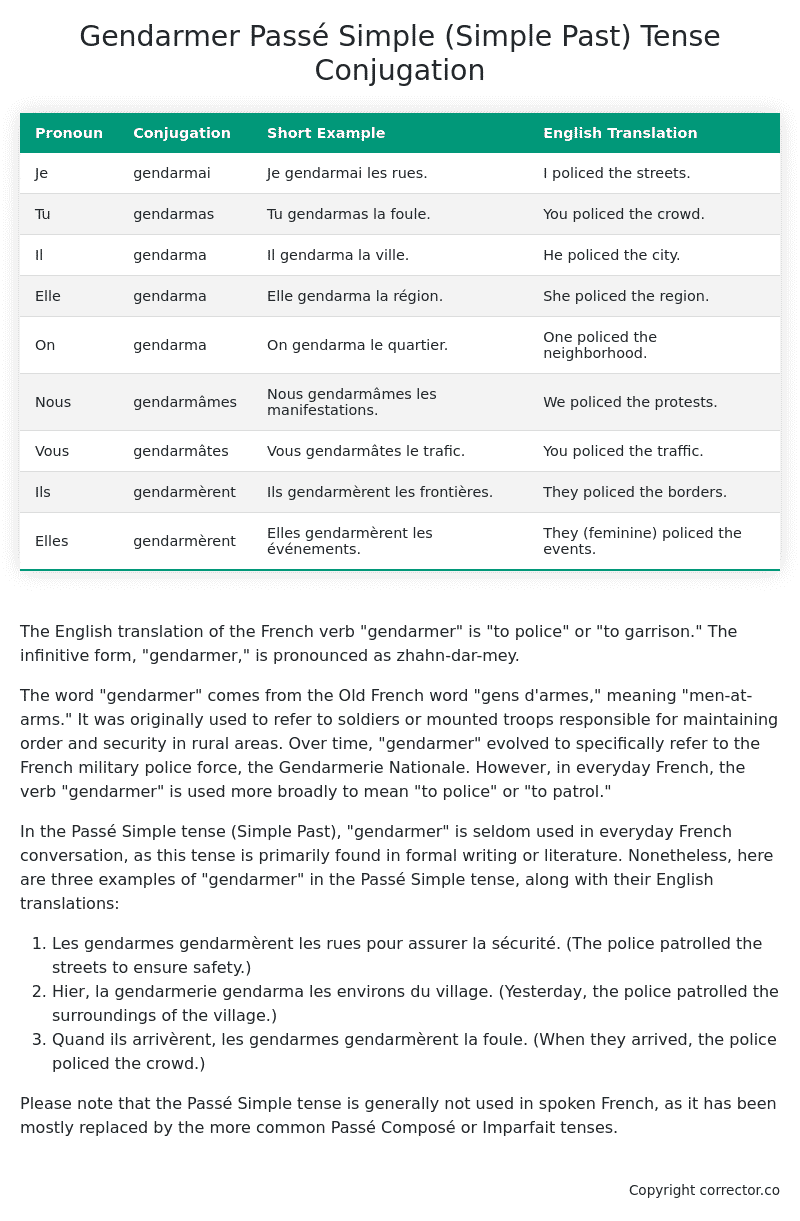Passé Simple (Simple Past) Tense Conjugation of the French Verb gendarmer
Introduction to the verb gendarmer
The English translation of the French verb “gendarmer” is “to police” or “to garrison.” The infinitive form, “gendarmer,” is pronounced as zhahn-dar-mey.
The word “gendarmer” comes from the Old French word “gens d’armes,” meaning “men-at-arms.” It was originally used to refer to soldiers or mounted troops responsible for maintaining order and security in rural areas. Over time, “gendarmer” evolved to specifically refer to the French military police force, the Gendarmerie Nationale. However, in everyday French, the verb “gendarmer” is used more broadly to mean “to police” or “to patrol.”
In the Passé Simple tense (Simple Past), “gendarmer” is seldom used in everyday French conversation, as this tense is primarily found in formal writing or literature. Nonetheless, here are three examples of “gendarmer” in the Passé Simple tense, along with their English translations:
- Les gendarmes gendarmèrent les rues pour assurer la sécurité. (The police patrolled the streets to ensure safety.)
- Hier, la gendarmerie gendarma les environs du village. (Yesterday, the police patrolled the surroundings of the village.)
- Quand ils arrivèrent, les gendarmes gendarmèrent la foule. (When they arrived, the police policed the crowd.)
Please note that the Passé Simple tense is generally not used in spoken French, as it has been mostly replaced by the more common Passé Composé or Imparfait tenses.
Table of the Passé Simple (Simple Past) Tense Conjugation of gendarmer
| Pronoun | Conjugation | Short Example | English Translation |
|---|---|---|---|
| Je | gendarmai | Je gendarmai les rues. | I policed the streets. |
| Tu | gendarmas | Tu gendarmas la foule. | You policed the crowd. |
| Il | gendarma | Il gendarma la ville. | He policed the city. |
| Elle | gendarma | Elle gendarma la région. | She policed the region. |
| On | gendarma | On gendarma le quartier. | One policed the neighborhood. |
| Nous | gendarmâmes | Nous gendarmâmes les manifestations. | We policed the protests. |
| Vous | gendarmâtes | Vous gendarmâtes le trafic. | You policed the traffic. |
| Ils | gendarmèrent | Ils gendarmèrent les frontières. | They policed the borders. |
| Elles | gendarmèrent | Elles gendarmèrent les événements. | They (feminine) policed the events. |
Other Conjugations for Gendarmer.
Le Present (Present Tense) Conjugation of the French Verb gendarmer
Imparfait (Imperfect) Tense Conjugation of the French Verb gendarmer
Passé Simple (Simple Past) Tense Conjugation of the French Verb gendarmer (You’re reading it right now!)
Passé Composé (Present Perfect) Tense Conjugation of the French Verb gendarmer
Futur Simple (Simple Future) Tense Conjugation of the French Verb gendarmer
Futur Proche (Near Future) Tense Conjugation of the French Verb gendarmer
Plus-que-parfait (Pluperfect) Tense Conjugation of the French Verb gendarmer
Passé Antérieur (Past Anterior) Tense Conjugation of the French Verb gendarmer
Futur Antérieur (Future Anterior) Tense Conjugation of the French Verb gendarmer
Subjonctif Présent (Subjunctive Present) Tense Conjugation of the French Verb gendarmer
Subjonctif Passé (Subjunctive Past) Tense Conjugation of the French Verb gendarmer
Subjonctif Imparfait (Subjunctive Imperfect) Tense Conjugation of the French Verb gendarmer
Subjonctif Plus-que-parfait (Subjunctive Pluperfect) Tense Conjugation of the French Verb gendarmer
Conditionnel Présent (Conditional Present) Tense Conjugation of the French Verb gendarmer
Conditionnel Passé (Conditional Past) Tense Conjugation of the French Verb gendarmer
Conditionnel Passé II (Conditional Past II) Tense Conjugation of the French Verb gendarmer
L’impératif Présent (Imperative Present) Tense Conjugation of the French Verb gendarmer
L’impératif Passé (Imperative Past) Tense Conjugation of the French Verb gendarmer
L’infinitif Présent (Infinitive Present) Tense Conjugation of the French Verb gendarmer
L’infinitif Passé (Infinitive Past) Tense Conjugation of the French Verb gendarmer
Le Participe Présent (Present Participle) Tense Conjugation of the French Verb gendarmer
Le Participe Passé (Past Participle) Tense Conjugation of the French Verb gendarmer
Struggling with French verbs or the language in general? Why not use our free French Grammar Checker – no registration required!
Get a FREE Download Study Sheet of this Conjugation 🔥
Simply right click the image below, click “save image” and get your free reference for the gendarmer Passé Simple tense conjugation!

Gendarmer – About the French Passé Simple (Simple Past) Tense
Formation
Usage
Narration
Historical Context
Interactions with other tenses
Passé Composé
Imparfait
Conditional and Subjunctive
Summary
I hope you enjoyed this article on the verb gendarmer. Still in a learning mood? Check out another TOTALLY random French verb conjugation!


